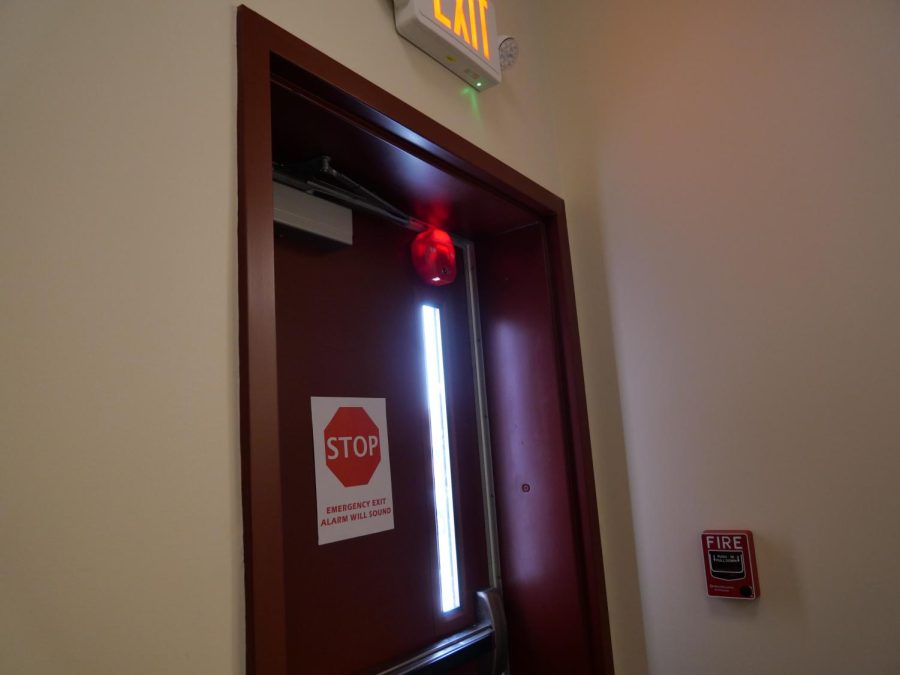Student Perspective: Door Alarm Distractions
March 31, 2022
Over the past few weeks, most Bellows Free Academy students and staff have become very familiar with PA system testing issues and lack of passing time bells making for an interesting assortment of sounds throughout the day. Another contributor has been the addition of alarms to all BFA doors, minus the connector.
The Mercury spoke to Heather Fitzgibbons, one of BFA’s assistant principals, to get an administrative perspective on the alarms.
“We are a school with a lot of entrances and exits, [so] we need to be able to monitor where people are coming in,” Fitzgibbons said. “These alarms are a way of doing that.”
According to Fitzgibbons, if any of the doors are opened at any point during or before the school day, a ringing alarm will sound to alert nearby monitoring staff that the door has been opened, so they can investigate it.
While the alarms were set for, “safety purposes,” according to Fitzgibbons, many students are not finding them beneficial.
According to an anonymous survey conducted by The Mercury, a percentage of BFA students are becoming frustrated with the alarms due to their distracting nature. About 46 percent of the 131 student respondents said that, given a scale where one was least distracting and five was extremely distracting, they rate the alarms a five.
“I am very frustrated with the alarms,” said one student. They added, “When I’m trying to focus and an alarm goes off, it completely throws me off and most times makes me lose my train of thought.”
According to another student, “All it takes is one individual to interrupt a lecture, and, if you’re lucky, the alarm will be right outside your classroom to reach maximum annoyance level.”
Others mentioned the perceived lack of purpose of the alarms.
“The door alarms from the inside are completely unnecessary and only make BFA feel like a prison instead of a school. The school’s security is supposed to protect from threats outside of the building and make sure they do not get inside,” one student said.
“What’s the point of having [door alarms] when kids [still] leave the school with them?” asked another.
This behavior was confirmed by respondents, as well. According to the survey, seven of the 131 respondents have purposefully set off the door alarms as a joke. Furthermore, 34 of the respondents said that they had set off the alarms by accident.
Many students expressed distaste for those setting off the alarms on purpose, with one student saying, “WHY IN THE WORLD are high school students acting like they are in 2nd grade and purposely setting off the alarm[?] It’s not a problem with the alarm, it is a problem with the people.”
According to one student, part of the issue lies in the alarmed doors not being noticeably marked as alarmed.
“If [the schools keeps] the alarms, then I think they should make all the doors have a notice on them,” said the student. They added, “I set one off by accident once when I was leaving early, and the door I left from was not marked.”
Fitzgibbons responded to this student’s remark, saying, “I believe all of the alarmed doors are marked now. There’s a possibility that this student [exited from a door that wasn’t marked] as the doors in the connector weren’t marked for a bit, but, as far as I know, they should all be marked now.”
Some students also offered alternatives to the current alarm system and schedule.
“I think in the mornings before school starts the doors should be open, [because having] other doors open would make it easier to get into school instead of having to walk all the way around,” one student said. They added, “Then at 7:30 and [8:10], lock them, and then [anyone] late can enter through the connector.”
According to Fitzgibbons, this would go against the intended purpose of the alarms.
“They’re really meant as a way to limit the entrances into the building,” Fitzgibbons said. She added, “They’re there for safety purposes, to keep people entering the building in a few select spots. If we open them all in the morning, [then] there’s potential for someone dangerous to get in.”
Another issue, according to the survey, was with students mistaking the alarm for a fire alarm. About 37 percent of respondents said that they had mistaken the door alarms for fire alarms before.
“When I am in a quiet classroom and the alarm goes off, I get anxious and on edge because it is scary and abrupt,” one student said.
Fitzgibbons agreed with this, saying, “They are disturbing, they are triggering. I would [say to] just try and bare with them. Hopefully, as students learn which doors are alarmed, we’ll see less alarms going off.”
Fitzgibbons also noted that, if any students have suggestions or questions about the alarms, they’re encouraged to come and speak to her about it.
“If anyone out there has any comments, questions, concerns or suggestions after reading [this article], [I’d] encourage them to come in and connect with us,” Fitzgibbons said. “Don’t assume you won’t be heard, because you will.”

